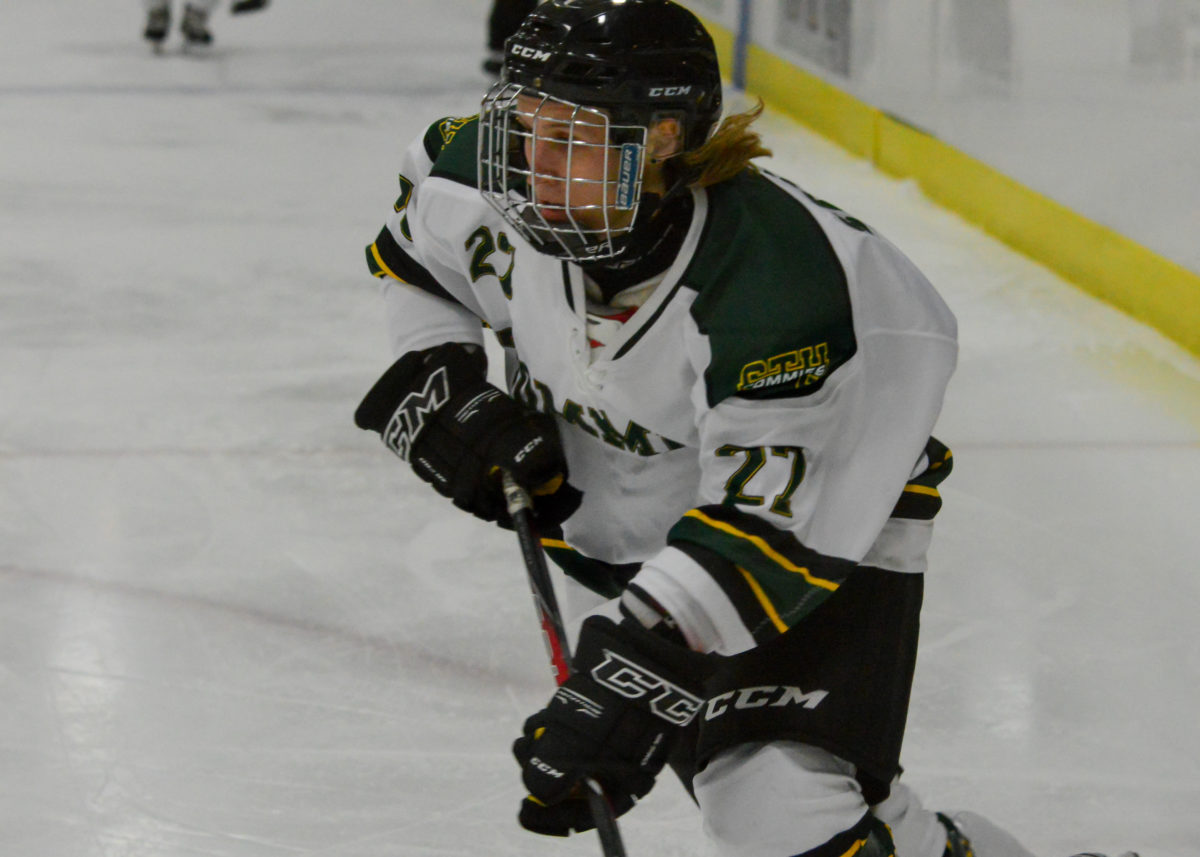When she speaks, you can tell she is from a different country. Her lack of the words “the” and “are” give it away. But when she skates, she’s in sync with everyone on the ice. It’s as though she speaks two languages: Russian and hockey.

Marina Sergina, 28, is from the small village Poliarnue Zori, on the north side of Russia. She came to Fredericton this year to play university hockey and to get an international degree from St. Thomas University.
“Moving to Canada was one of the biggest experiences in my life,” said Sergina, who played 12 years of professional hockey in Russia. “In Russia, hockey is professional sport. You don’t have to be a student or have a job to play hockey in Russia.”
Hockey wasn’t always her top sport priority. It was speed skating that she really loved. She’d been speed skating for years, but it wasn’t until she graduated high school that she switched sports and decided to play hockey on a regular basis. Her speed skating coaches helped her find a hockey team in Moscow, and in March 2003 she took a train and went to tryouts. After a successful week, the team invited her back to Moscow for the summer. She played there for the rest of her career in Russia.
This gave Sergina the opportunity to play on the international stage. Between 2008 and 2012 she made four appearances for Russia at the IIHF Women’s World Championships. The championship in 2011 was a breakout year for Sergina, where she averaged a point per game throughout the tournament.
“We were so close to a medal,” said Sergina. “We beat Switzerland to go into the bronze medal. It was a really rough game. We were never that close to a medal in previous years, so we were really excited and I was happy to be contributing.”
Sergina was at the Russia championship when she found out she made the Vancouver 2010 Olympic team through a teammate at practice.
“She checked the list on the Internet, and I thought she was joking at first,” she said. “It was a big weight off my shoulders, and I was overwhelmed with happiness.”
Sergina played in all five games at the Olympics and led her team in points while recording one goal and two assists for the team.
When Sergina arrived in Canada for the Olympics, she was speechless. She was excited for the famous faces she would see on a daily basis. If she wanted to meet someone, she could simply just walk into the cafeteria in the village and be able to sit with them.
“I really wanted to meet a speed skater from Holland and get an autograph. He’s one of the best in the world. Sven Kramer… I used to be a speed skater when I was younger so meeting him would have been great but I was too nervous to speak to him and I couldn’t speak English well enough,” said Sergina.
The games had brought Canada closer together as a nation, which appealed to Sergina. The red and white crowds carried an overwhelming sense of pride.
“It was amazing!” said Sergina. “I was so proud and happy to represent my country in Vancouver. Olympic Games is something that I will never forget about.”
Little did she know, four years later she would be back in the Great White North. Her communication skills were weak at first, but she’s been working on it. With the help of her teammates, she is able to do her assignments with some ease.
Her teammate, Eliza Snider, gives Sergina a hand when she needs it. Snider says that having Sergina around has been great for the team.
“We definitely have outside influence and culture influence, not just on the ice but off the ice as well. I know she’s teaching some of us her Russian, so that’s pretty exciting. But on the ice she definitely plays a different style of game — more physical than what we play,” said Snider. “But I think it’s a good adjustment for the girls, especially pushing us harder in practice.”
This is Sergina’s first year of university. Though she misses her home in Russia and her previous experiences, she is enjoying the Canadian experience and knows there is much more to come for her.
